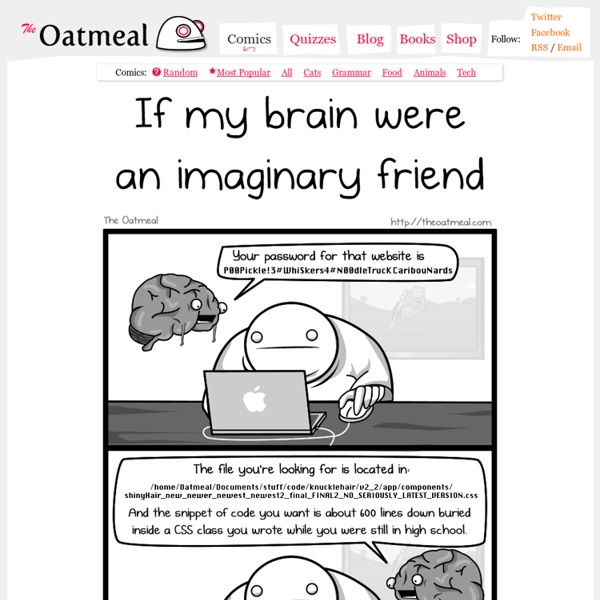



http://theoatmeal.com/comics/brain
Related: read for lifeValues Explanations > Values About values | Historical values | Research on values | So what? Values is a confusing word that often gets confused with 'value' as in the value you get from buying a cheap, but well-built house. Values are, in fact powerful drivers of how we think and behave.
It is possible to understand Engineers - Where there's a will, there's a way. Understanding Engineers #1 Two engineering students were biking across a university campus when one said, "Where did you get such a great bike?" The second engineer replied, "Well, I was walking along yesterday, minding my own business, when a beautiful woman rode up on this bike, threw it to the ground, took off all her clothes and said, "Take what you want." The first engineer nodded approvingly and said, "Good choice, The clothes probably wouldn't have fit you anyway." DIY - inventions & repairs Posted on March 26, 2012 in Humor If you’re new here, you may want to subscribe to our RSS feed or follow us on Facebook or Twitter . Thanks for visiting!
Postmodernism and Truth Explanations > Critical Theory > Concepts > Postmodernism and Truth Pre-modernist truth | Modernist truth | Post-modernist truth | See also Postmodernism can be a confusing concept that gets dropped into intellectual conversation and presentations, typically to make a complexifying point that prevents easy conclusions being made. But what is postmodernism? Mostly, it is about truth. Or not.
Saturday Morning Breakfast Cereal <map name="admap71632" id="admap71632"><area href=" shape="rect" coords="0,0,728,90" title="" alt="" target="_blank" /></map><table cellpadding="0" cellspacing="0" style="width:728px;border-style:none;background-color:#ffffff;"><tr><td><img src=" style="width:728px;height:90px;border-style:none;" usemap="#admap71632" alt="" /></td></tr><tr><td style="background-color:#ffffff;" colspan="1"><center><a style="font-size:10px;color:#0000ff;text-decoration:none;line-height:1.2;font-weight:bold;font-family:Tahoma, verdana,arial,helvetica,sans-serif;text-transform: none;letter-spacing:normal;text-shadow:none;white-space:normal;word-spacing:normal;" href=" target="_blank">Ads by Project Wonderful! Your ad here, right now: $0</a></center></td></tr></table> Archives Contact Forum Store! April 15, 2011 Kapow! We've reconstituted the SMBC Facebook Club.
Bizarre Suicide 1994's MOST BIZARRE SUICIDE At the 1994 annual awards dinner given by the American Association for Forensic Science, AAFS President Don Harper Mills astounded his audience in San Diego with the legal complications of a bizarre death. Here is the story. Is Google Making Us Stupid? The process of adapting to new intellectual technologies is reflected in the changing metaphors we use to explain ourselves to ourselves. When the mechanical clock arrived, people began thinking of their brains as operating “like clockwork.” Today, in the age of software, we have come to think of them as operating “like computers.” But the changes, neuroscience tells us, go much deeper than metaphor. Thanks to our brain’s plasticity, the adaptation occurs also at a biological level. The Internet promises to have particularly far-reaching effects on cognition.
How to win Rock-paper-scissors every time I admit it. When I first heard there are actual tournaments for Rock-paper-scissors, sanctioned by the World Rock Paper Scissors Society, I laughed. I mean seriously, $50k to the winner of a game that requires no skill whatsoever? Absurd. Boy was I wrong. Rock-paper-scissors isn't just a silly game kids play or a way to decide who has to be the designated driver at parties. How to know it all The way to know it all is to change the definition of “all.” Schools do this, for example, by defining “all” to mean everything on a test. Then it’s possible for someone to know it all. Schools create the illusion that the world is finite. You may not know everything, but someone does.
Experts rethink good study habits Ask someone for tips on proper study skills, and you’re likely going to get an answer that ranges from “study in a quiet, sealed room” to “drink a sip of water each time you need to remember a fact.” But from folksy suggestions to ideas based in actual science, study skills are just about how well you train your brain to absorb information. The New York Times reports that scientists have determined a few simple techniques that can enable a student to absorb more information.
All the insanity of modern car culture, in one image « Williams-Sonoma wants to sell you a chicken coop Power source of the future: Snails » 40 comments Comments THE MACHINE STOPS ... E.M. Forster Imagine, if you can, a small room, hexagonal in shape, like the cell of a bee. It is lighted neither by window nor by lamp, yet it is filled with a soft radiance. There are no apertures for ventilation, yet the air is fresh. There are no musical instruments, and yet, at the moment that my meditation opens, this room is throbbing with melodious sounds.